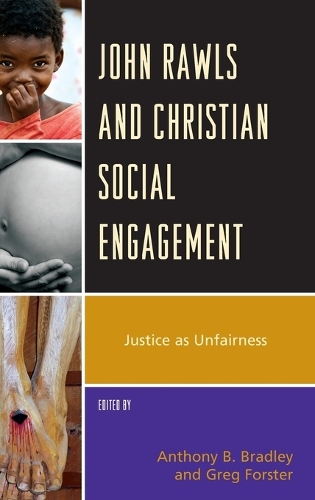
John Rawls and Christian Social Engagement: Justice as Unfairness
(Hardback)
Publishing Details
John Rawls and Christian Social Engagement: Justice as Unfairness
By (Author) Greg Forster
Edited by Anthony B. Bradley
Contributions by Matthew Arbo
Contributions by Hunter Baker
Contributions by Jerome C. Foss
Contributions by Daniel Kelly
Contributions by Joseph Knippenberg
Contributions by Bryan McGraw
Contributions by Matthew Parks
Contributions by Karen Taliaferro
Bloomsbury Publishing PLC
Lexington Books
18th December 2014
United States
Classifications
Professional and Scholarly
Non Fiction
Social and political philosophy
Central / national / federal government policies
Cultural studies
320.011
Physical Properties
Hardback
216
Width 163mm, Height 239mm, Spine 22mm
463g
Description
This book critiques the Rawlsian concepts of justice as fairness and public reason from the perspective of Christian political theory and practice. The Rawlsian paradigm has become pervasive in multiple disciplines outside political philosophy and is unconsciously embedded in a great deal of Christian public discourse; this calls for a new level of analysis from Christian perspectives. This is the first volume to examine Rawls based on Christian principles drawn from theological ethics, social thought, political theory and practical observation. In addition to theoretical perspectives, the book connects its critique of Rawls to specific hot-topic practical questions in three areas: social issues (abortion, marriage, etc.), economic issues (wealth creation, poverty programs, etc.), and the increasing difficulty of political compromise and peaceful coexistence in the context of the culture war. The book includes some of the leading Christian political theorists in America.
Reviews
This timelybookexplains the enormous impact John Rawlshas on secularnotions ofrelativism which havequietlycrept into the Church. Itis a must read for anyone seeking a Biblically based world view. -- David C. Iglesias, Wheaton College
This collection of essays affirms what many of us know and feel about justiceit is metaphysical not political. It provides a thoughtful analysis of the disastrous theoretical and sociopolitical consequences of a Rawlsian conception of justice that is rooted in a hypothetical thought experiment. Each essay makes Rawls accessible to the newcomer and is a refresher to the seasoned scholar. The collection confronts readers with the need to ground their understanding and application of justice on the basis of the divine design of human nature and flourishing and not on theoretical artifices removed from nature and reality. -- Gerson Moreno-Riano, Regent University
Author Bio
Anthony B. Bradley is associate professor of theology at the King's College. Greg Forster is senior fellow at the Friedman Foundation for Educational Choice.
